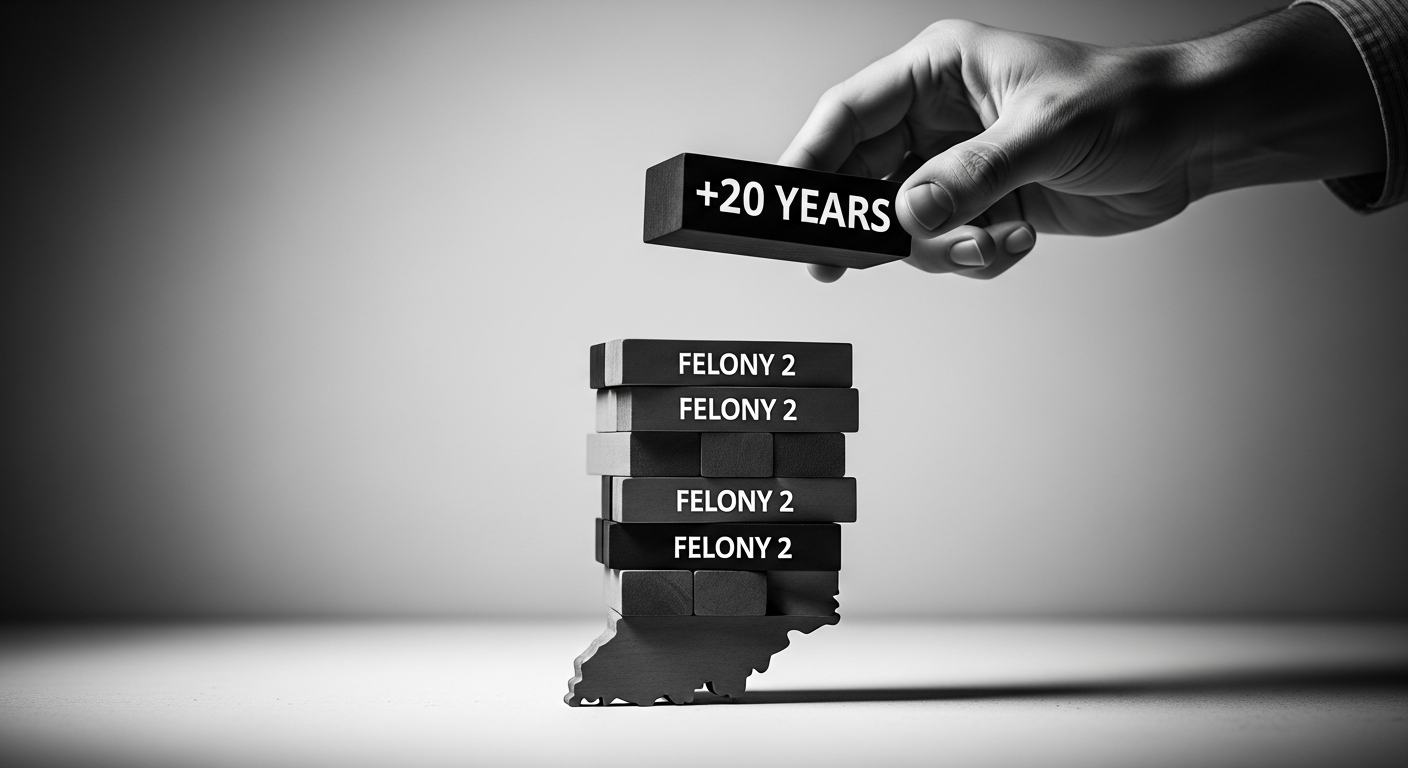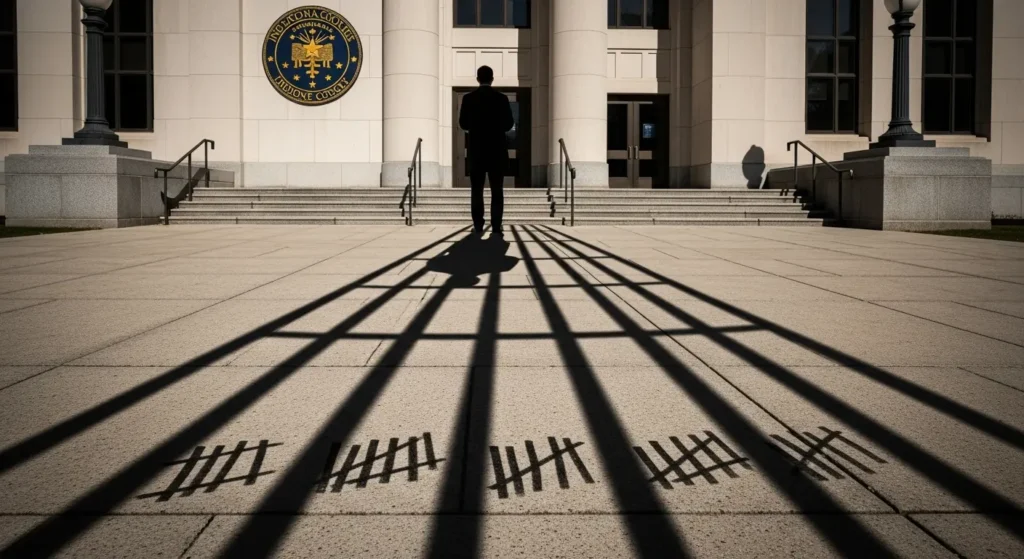
Many people are shocked to learn that a prior conviction can significantly increase their sentence if they are charged with a new crime in Indiana. The state’s habitual offender enhancements can add years, or even decades, to a prison term. But what exactly does it mean to be labeled a “habitual offender,” and how can you fight this kind of enhancement?
At Eskew Law, understanding the law is one of the best ways to protect your future. As our team often reminds clients, “The difference between a fair sentence and a devastating one can hinge on how the habitual offender allegation is challenged.”
Let us walk through what this enhancement means, how it applies, and why having the right criminal defense lawyer in Indianapolis can make all the difference.
What Is a Habitual Offender Enhancement?
Under Indiana Code § 35-50-2-8, the habitual offender statute permits prosecutors to request an enhanced penalty for individuals with multiple prior felony convictions. The goal of the statute is to punish repeat offenders more severely, but in practice, it often results in excessive sentences that fail to consider rehabilitation or personal growth.
Unlike a separate criminal charge, the habitual offender enhancement is an add-on to an existing felony case. This means that if the prosecutor files the enhancement and the court finds it applicable, your sentence for the underlying crime may be extended significantly.
For example:
- A person convicted of a Level 5 felony may face an additional sentence of two to six years if a habitual offender finding is made.
- A Level 1 through Level 4 felony may add six to twenty years to the original sentence.
These numbers vary depending on the class of felony and the individual’s prior record.
What Qualifies Someone as a Habitual Offender in Indiana?
Indiana’s habitual offender law does not automatically apply to anyone with multiple prior convictions. The statute has specific criteria based on the number and severity of past offenses, the timing of the offenses and the severity of the new current charge.
For a habitual enhancement to be filed on a murder through level 4 felony, prosecutors must prove that:
- You have two or more prior unrelated felony convictions.
- One of the felonies must be considered a major felony (Murder through Level 5, or an A, B or C felony under the old statute).
For a habitual enhancement to be filed on a Level 5 felony, prosecutors must prove that:
- You have two or more prior unrelated felony convictions.
- One of the felonies must be considered a major felony (Murder through Level 5, or an A, B or C felony under the old statute).
- If one of the two prior felonies is a Level 5, 6, C or D felony, not more than 10 years has passed since the individuals release from imprisonment, parole or probation.
Another way that the state may file the habitual offender enhancement is if the offender:
- Three prior unrelated felony convictions.
- If one of the two prior felonies is a Level 5, 6, C or D felony, not more than 10 years has passed since the individuals release from imprisonment, parole or probation.
Certain crimes, such as minor drug possession or low-level thefts, might still trigger the enhancement even though they are non-violent. This is one reason why the habitual offender statute has faced criticism for being overly harsh.
How Prosecutors Use the Enhancement
In many Indiana counties, prosecutors routinely add the habitual offender allegation to their filings when a defendant has a qualifying record. This tactic often serves as leverage in plea negotiations. The state might threaten the enhancement to encourage a defendant to accept a plea deal, even when the enhancement could be challenged or proven inapplicable.
Chris Eskew of Eskew Law often tells clients, “We never assume that a habitual offender enhancement automatically applies. Every detail of your criminal record and timeline matters.”
An experienced defense team knows how to scrutinize the prior convictions, review court records, and challenge the legal sufficiency of the state’s filing. Even a slight discrepancy in the dates or nature of previous convictions can make a significant difference.
The Role of the Jury and Proof Requirements
When the prosecution alleges that a defendant is a habitual offender, Indiana law requires a bifurcated trial, meaning it occurs in two parts:
- Phase One: The jury or judge determines whether the defendant is guilty of the underlying offense.
- Phase Two: If found guilty, the court then holds a separate proceeding to determine whether the habitual offender enhancement applies.
The prosecution must prove the prior convictions beyond a reasonable doubt, just as it must for any other element of a criminal charge. Defense attorneys can challenge whether the previous convictions meet the statutory definition, whether they were appropriately obtained, or whether the alleged crimes are too old to be considered under Indiana law.
How Enhancements Impact Sentencing

Being labeled a habitual offender can drastically increase a person’s prison sentence. For instance:
- Someone convicted of a Level 5 felony (which typically carries a sentence of one to six years) could see their penalty nearly double with an enhancement.
- In severe cases, enhancements can add decades to a sentence, often transforming what would have been a moderate term into a life-altering punishment.
These outcomes underscore why defendants must have an Indianapolis, IN defense attorney who understands how to fight habitual offender allegations from the very beginning.
Possible Defenses and Strategies
Defending against a habitual offender enhancement requires careful legal analysis and creative strategy. The team at Eskew Law often explores the following avenues:
1. Challenging the Validity of Prior Convictions
If one of the previous convictions was improperly obtained, such as through an invalid plea, lack of counsel, or constitutional violation, it may be excluded from the enhancement calculation.
2. Arguing That the Offenses Are Related
If two prior felonies arose from the same criminal episode, they might not qualify as “unrelated” convictions under Indiana law.
3. Examining Timing and Classification
Indiana’s statute contains time-based limitations and differentiates between levels of felonies. Misclassification or incorrect time frames can render the enhancement invalid.
4. Negotiating Alternatives
In some cases, strong pretrial advocacy or plea negotiations can persuade prosecutors to drop or reduce the enhancement, particularly when it would result in an unduly harsh sentence.
Why These Enhancements Are Controversial
Habitual offender laws in Indiana have long been the subject of debate. Critics argue that they contribute to prison overcrowding and disproportionately punish non-violent offenders. Supporters claim they are necessary to deter repeat crime.
However, sentencing enhancements often fail to account for rehabilitation, addiction recovery, or mental health factors. For that reason, it is crucial to have a defense team that can humanize your story and advocate for fairness at every stage.
At Eskew Law, we take pride in understanding not only the statutes but also the people behind them. We believe that no one should be defined entirely by their past.
How Eskew Law Can Help
Habitual offender enhancements can be complex and intimidating. Our team has extensive experience defending individuals across Indiana who face these severe allegations. We understand how prosecutors build their cases and where errors are most likely to occur.
Our approach includes:
- Conducting an in-depth review of your criminal record.
- Identifying possible legal or factual challenges.
- Negotiating with prosecutors for fair resolutions.
- Preparing strong trial strategies to contest enhancements before the court.
At Eskew Law, we believe every person deserves an advocate who understands their story and fights for their rights with compassion and precision.
Call Eskew Law For Assistance
A habitual offender enhancement can dramatically change the outcome of a criminal case. Understanding what it means, when it applies, and how to fight it could make the difference between a manageable sentence and a devastating one.
If you or a loved one faces this kind of allegation, reach out to Eskew Law today. We are ready to evaluate your case, explain your options, and build the strongest defense possible. Your future is worth fighting for, and we are here to help you protect it.








